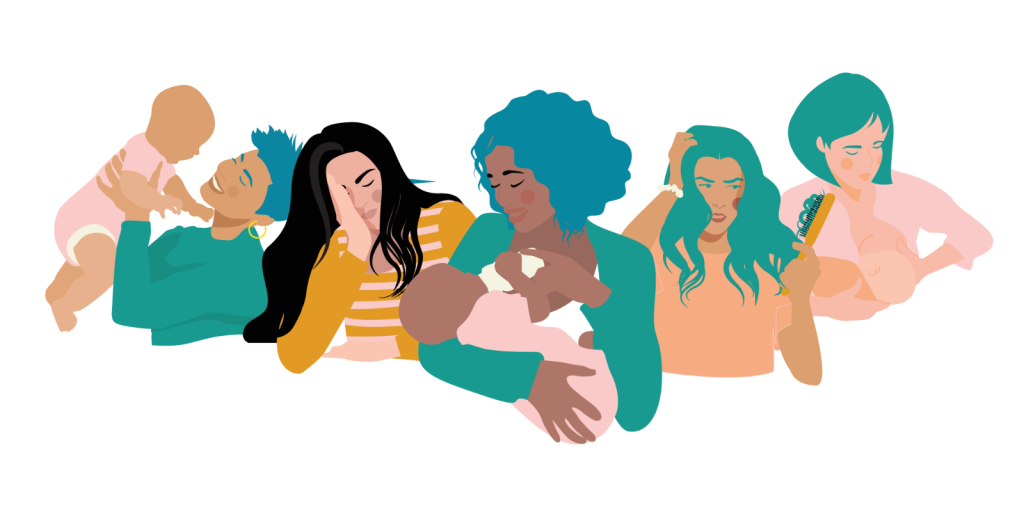International Women’s Day 2024: Inspiring Inclusion for New Mums

International Women’s Day marks an occasion for collective global activism as we celebrate the fight towards a gender equal world. The campaign theme for IWD 2024 is Inspire Inclusion. Today the world pauses to reflect on the experiences of women everywhere, and this year, Mumie want to continue raising our voices in encouraging the discussion of postnatal journeys.
Often we find that the mother’s story after giving birth goes missing in the narrative. It’s important we raise awareness of postnatal experiences and work together to ensure that new mums feel heard, understood, included and valued, today and every day.
Understanding maternal mental health
Although as a society we are starting to talk more openly about mental health, there is still a lot more work to be done in normalising the conversation, and this includes discussion of perinatal mental illness, which affects up to 27% of new and expectant mums.
It’s very natural to experience a range of emotions during pregnancy and after giving birth. After all, this is a huge life event. But when this starts to impact day to day life, it’s time to seek help and advice from your GP or health visitor. There is already a reasonable level of awareness of postnatal depression, but it’s well recognised that many women go undiagnosed. Although the ‘baby blues’ is considered normal in the first two weeks after giving birth, when feelings of sadness, low mood and lack of energy persist, it is important to talk to someone. Often women do not realise they have postnatal depression, or they may not want to speak up about these issues, for fear of judgement. As a society we need to ensure mums feel confident in raising these issues and looking after their mental health after giving birth.
There are other postnatal mental health issues that are not as often discussed, and it’s important to raise awareness. These include postnatal anxiety, which involves feelings of unease, worry or fear, Obsessive Compulsive Disorder (OCD), which involves obsessive and compulsive symptoms, as well as difficult intrusive thoughts that affect daily life, and postnatal PTSD, also known as birth trauma, which develops because of traumatic events during childbirth. It can be difficult to unpick what might be happening, which is why the Mumie app includes a symptom checker to help explore and understand why you might be feeling the way you are, and guide you to the right help.
Remember that there is support available. As a new mum it is not your fault you feel this way, and it does not mean you are a ‘bad mother’. Being open and honest if you are struggling is the bravest thing you can do for yourself and your baby.
Let’s keep talking about perinatal mental health as often as we can, to increase societal awareness and normalise mum mental health. Find out more in our blog on maternal mental health.
Breastfeeding in public
Firstly, if you are breastfeeding your baby, you should do so wherever you feel most comfortable. If that means you’d rather breastfeed your baby in private, with no one else around, that is totally acceptable.
As you start getting more confident, you may feel open to breastfeeding in front of other people, in public spaces. There is a lot more inclusion and acceptance of breastfeeding in public such as in cafés, shopping centres and on public transport, but there is still more work to be done. NHS guidance encourages breastfeeding women to:
- Know your rights. It’s illegal for anyone to ask a breastfeeding woman to leave a public space.
- Plan ahead. Have a think about where you will feel most comfortable breastfeeding when you are out. This is something you can discuss at a local breastfeeding group, or chat to your midwife or heath visitor about.
- Consider your clothes and bra. This depends on what you feel most comfortable in, and whether you prefer loose or stretchy tops. You can also consider wearing a breastfeeding bra (we love Cake Maternity – get 15% off selected collections with code MUMIEH15) or a baby sling which allows you to breastfeed while baby is in the sling. We’ve tried the Ergobaby Omni 360 sling which once you crack it, makes breastfeeding on the go a breeze.
- Take someone with you. If you’d rather not be alone when you go out, bring someone with you, like a friend with an older baby who knows where to go, or your partner or mum.
- Avoid public toilets. Do not let anyone make you feel like you have to go into public loos to feed your baby.
Breastfeeding is a beautiful, natural process and no woman should be made to feel ashamed or discriminated against when feeding their baby in public.
Breastfeeding and going back to work
Although some women may have a longer maternity leave, others may return to work. This is a topic that needs to be more openly discussed, as it is often believed that returning to employment means you have to stop breastfeeding. In fact, return to work is often cited as the most common reason a mother will end her breastfeeding journey prematurely. However this needn’t be the case; there are lots of options.
Whilst some women may arrange childcare close to work so that they can breastfeed during breaks, or before and after work, others may express breast milk by hand or using a pump so that someone else can feed their baby while they are at work. We recommend the Elvie wearable breast pump for collecting on the go or for a more traditional pump we have found the Medela Swing Maxi Double comfortable and efficient to minimise your pumping time!
However, employers do have certain legal obligations to breastfeeding mothers. You should give your employer written notification that you are breastfeeding. They must then conduct a risk assessment, and by law they must provide suitable facilities where you can rest. It is good practice for employers to provide a private, healthy and safe environment for you to express and store milk. This should be a clean, warm, private room, not the toilet. Some employers have a breastfeeding policy, and this can include provisions such as a break allowance to express milk, a secure and clean fridge for storage, and flexible working hours.
Get in touch with your HR department and discuss your options early, and have a read of our blog on making breastfeeding at work, work. This is an important conversation for new mums to have, and you should always feel comfortable, included and supported by your employer, and in no way at a disadvantage. You should not feel you have to stop breastfeeding just because you are returning to work.
‘Mum shaming’ and ‘bounce-back’ culture
Social media platforms such as Instagram have given way to the concept of ‘idealised motherhood’ or ‘picture-perfect motherhood.’ This can be dangerous for new mums, with research finding that nearly two-thirds of mums surveyed agree they have driven themselves to exhaustion with the pressure to be ‘supermum’, and one in five saying the plight has affected their mental health.
Comparing yourself to other mothers and trying to meet unrealistic standards can cause feelings of guilt and high levels of stress. Fear of judgement and others seeing imperfections, and not prioritizing guilt-free downtime, are all a result of pressure to be ‘supermum’.
The modern mother is not only expected to ‘naturally’ excel at parenting, but to also look great while doing so. ‘Bounce-back’ culture puts unnecessary pressure on mums to ‘get back in shape’ and return to ‘pre-baby bodies’ as soon as possible – once the baby is born, the media messaging is not to rest and recover, but to snap back into the bodies and behaviours you had before getting pregnant. This is a dangerous narrative, and society’s treatment of the modern mother has to change. ‘Mum shaming’ is not acceptable in today’s world – there must be understanding, inclusion and compassion for mums whose bodies and minds have been through so much, and who are simply trying their best for their new baby each and every day.
To mums – be kind to yourself. You are doing your very best, and it’s okay to remind others of that if you feel anyone is pressuring you to ‘bounce back’. Be honest about how you are feeling, look after yourself and love who you are now, with your precious new baby that you couldn’t have brought into the world without such a strong body and mind.
Let’s keep the conversation going
There is empowerment in not only inspiring others to understand the experience of a new mum, but also in seeing women themselves feeling inspired to be included, and taking control of their own relevance and sense of belonging.
Let’s raise awareness of mums’ lives after they welcome their baby into the world, so we can keep the conversation moving, open up understanding of the range of postnatal experiences, and inspire the inclusion that all new mothers deserve.

Karen McCusker is a Copywriter from Ireland, with a passion for creating meaningful connections with others through language. Her goal is to amplify women’s voices and experiences through her writing. She describes herself as a storyteller at heart, and the ultimate “Swiftie”


 by team
March 8, 2024
by team
March 8, 2024